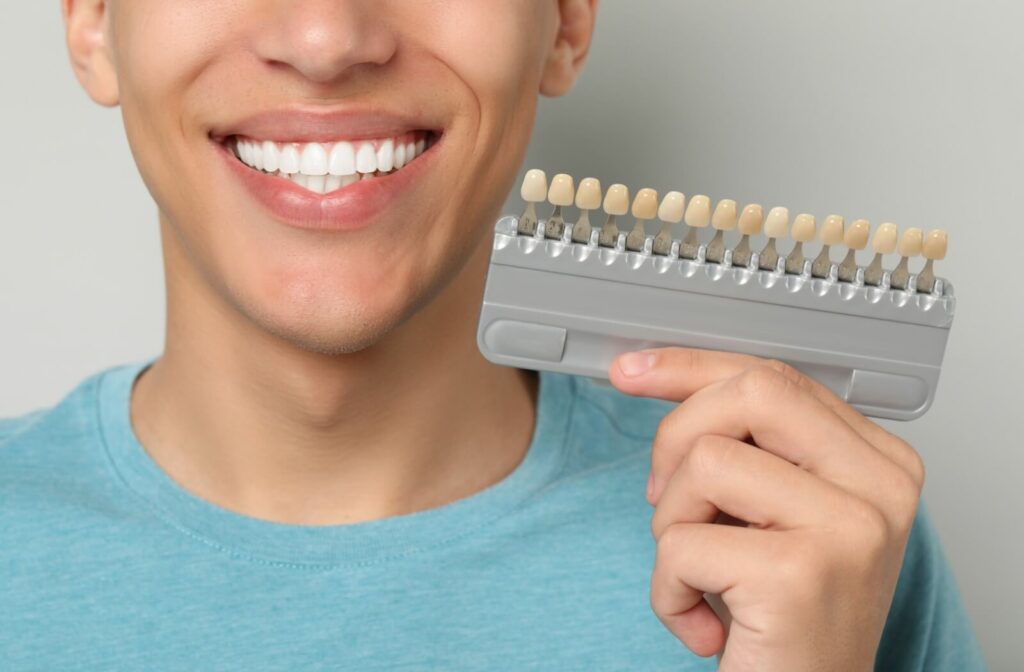Veneers are special coverings which are permanently bonded to your teeth. They are made from porcelain or a resin composite and are shaped and coloured to look identical to teeth. Veneers can be a great, long-lasting way to address cosmetic and aesthetic concerns you may have about your teeth.
Since veneers can last up to 20 years, you might wonder if they will stain. Porcelain veneers are durable and should not stain unless in extreme circumstances. Composite veneers are less durable than porcelain veneers and may stain if improper mouth hygiene is used.
What Are the Benefits of Veneers?
Veneers can address aesthetic and cosmetic concerns that you may have about your teeth. Veneers can help you overcome dental insecurities and build your confidence. Some common oral issues that veneers can fix include:
- Stained teeth
- Misaligned or damaged teeth
- Tooth gaps
- Irregularly shaped teeth
There are some non-cosmetic reasons to get veneers. Tooth gaps can cause more damage than making you feel insecure. Sometimes, if a tooth gap makes it difficult to practice proper oral hygiene, you may be at a higher risk of plaque buildup and tooth decay.
If you have difficulty maintaining a gap in your teeth, consult your dentist to see if you are a candidate for veneers.
Can You Stain & Damage Your Veneers?
While veneers should be maintained with proper oral hygiene and following your dentist’s instructions, there are still ways to damage veneers.
Staining
One way you can damage your veneers is through staining. Porcelain veneers are made from non-porous materials, so they are much less likely to stain than real teeth or composite veneers. Composite veneers are made from a porous material, similar to real teeth. Being porous means that composite materials will stain more easily than porcelain veneers.
Veneers can be stained due to:
- Frequent consumption of coffee, tea, and cigarettes
- Gum recession and internal damage to real teeth can create the illusion of staining
- Poor oral hygiene
Excessive Pressure
Applying too much pressure to your veneers can cause them to crack, loosen, or break. This can lead to damage to the teeth underneath your veneers or the need to replace veneers earlier than anticipated. Some kinds of pressures that can damage veneers are:
- Clenching and grinding teeth
- Chewing hard objects like fingernails, ice, or hard candies
Poor Oral Hygiene
Poor oral hygiene can stain veneers, but the damage can go deeper than that. Not brushing and flossing properly can lead to plaque buildup around the edges of your teeth. This buildup can lead to veneers loosening or even falling off, which can lead to a need for repairs.
Additionally, if your veneers are improperly sealed, you risk developing cavities in the teeth underneath the veneers. Damage to the teeth underneath your veneers may require a complete reinstallation earlier than anticipated.
Can You Whiten Your Veneers?

If you find that your veneers seem stained, don’t panic. Don’t run out to buy an at-home whitening treatment either. Veneers don’t respond well to at-home whitening treatments like whitening strips or teeth-whitening kits. Overusing whitening treatments on your veneers may eventually lead to veneer damage.
Since at-home whitening treatments have the potential to damage your veneers it’s important to consult your dentist if you are concerned about veneer staining. Your dentist can provide you with whitening treatments for your veneers, letting you get back to a pearly-white smile.
Are Veneers Right For You?
If you are starting to think about veneers, it’s important to ask your dentist if you are a candidate for veneers. Certain factors may make you a bad candidate for veneers, including:
- Untreated dental and gum disease
- Eroded enamel can make it difficult for veneers to bond to teeth
- There is not enough of a tooth for the veneer to be attached to
- Chronic tooth clenching and grinding puts you at risk of breaking veneers
Only your dentist can tell you if veneers are the right or wrong choice for you. If cautioned against getting veneers, ask your dentist for alternative options. If veneers are not for you, you may still be a good candidate for dental bonding or dental crowns to treat problematic teeth.
Starting the Process
The first step to getting veneers is to book a dental exam and consult your dentist about veneers. They can create a treatment plan to custom-fit veneers to your mouth. At Dentistry on Danforth, we offer porcelain veneer installation and other cosmetic and dental procedures to help you feel confident in your smile.
If you want to start the process of getting veneers or just need a dental exam and cleaning, our professional staff would be more than happy to help. To learn more about our team and our practice, you can contact us or book an appointment today.


